Rays is committed to sustainable practices and ethical production, focusing on reducing environmental impact while ensuring high-quality products. By utilizing recycled materials and eco-friendly manufacturing processes, the brand not only prioritizes the planet but also upholds fair labor standards and transparency in its supply chain. Through these initiatives, Rays aims to positively influence local communities and promote economic growth alongside environmental responsibility.

How does Rays implement sustainable practices?
Rays implements sustainable practices through a comprehensive approach that focuses on reducing environmental impact while maintaining high-quality production. This includes the use of recycled materials, eco-friendly manufacturing processes, and energy-efficient logistics.
Use of recycled materials
Rays prioritizes the use of recycled materials in its products, significantly reducing the demand for virgin resources. By incorporating materials such as recycled plastics and fabrics, the brand minimizes waste and promotes a circular economy.
For instance, Rays sources recycled polyester from post-consumer plastic bottles, which not only diverts waste from landfills but also lowers carbon emissions associated with production. This practice aligns with global sustainability goals and appeals to environmentally conscious consumers.
Eco-friendly manufacturing processes
The manufacturing processes at Rays are designed to minimize environmental impact through the use of non-toxic dyes and water-efficient techniques. By adopting practices that reduce water usage and eliminate harmful chemicals, Rays ensures that its production is both safe for workers and the planet.
Additionally, the brand adheres to international environmental standards, such as ISO 14001, which guides organizations in improving their environmental performance. This commitment to eco-friendly manufacturing not only enhances product quality but also builds trust with consumers.
Energy-efficient logistics
Rays employs energy-efficient logistics strategies to reduce its carbon footprint during transportation. This includes optimizing shipping routes and utilizing eco-friendly packaging materials that are lightweight and recyclable.
By partnering with logistics providers that prioritize sustainability, Rays ensures that its products reach customers with minimal environmental impact. This approach not only lowers transportation emissions but also contributes to overall cost savings, which can be passed on to consumers.
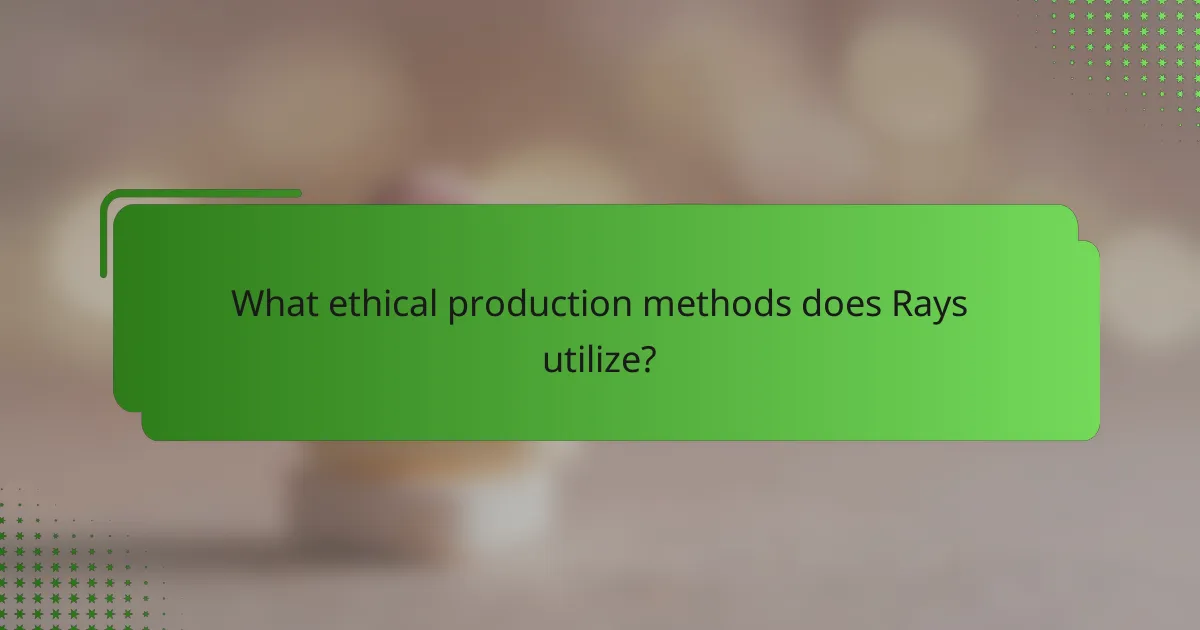
What ethical production methods does Rays utilize?
Rays employs a range of ethical production methods that prioritize sustainability and social responsibility. These practices include fair labor standards and transparency throughout their supply chain, ensuring that their products are made with respect for both people and the planet.
Fair labor practices
Rays is committed to fair labor practices, which means they ensure all workers involved in the production process receive fair wages and work in safe conditions. They adhere to international labor standards, promoting a work environment free from discrimination and exploitation.
To maintain these standards, Rays conducts regular audits of their facilities and partners, ensuring compliance with labor laws. They also support initiatives that empower workers, such as skill development programs and community engagement activities.
Transparency in supply chain
Rays emphasizes transparency in their supply chain by openly sharing information about sourcing and production processes. This approach allows consumers to understand where their products come from and the ethical practices involved in their creation.
By collaborating with suppliers who share their commitment to ethical standards, Rays can trace the journey of their materials from origin to finished product. They provide detailed reports on their website, highlighting the steps taken to ensure sustainability and ethical production.
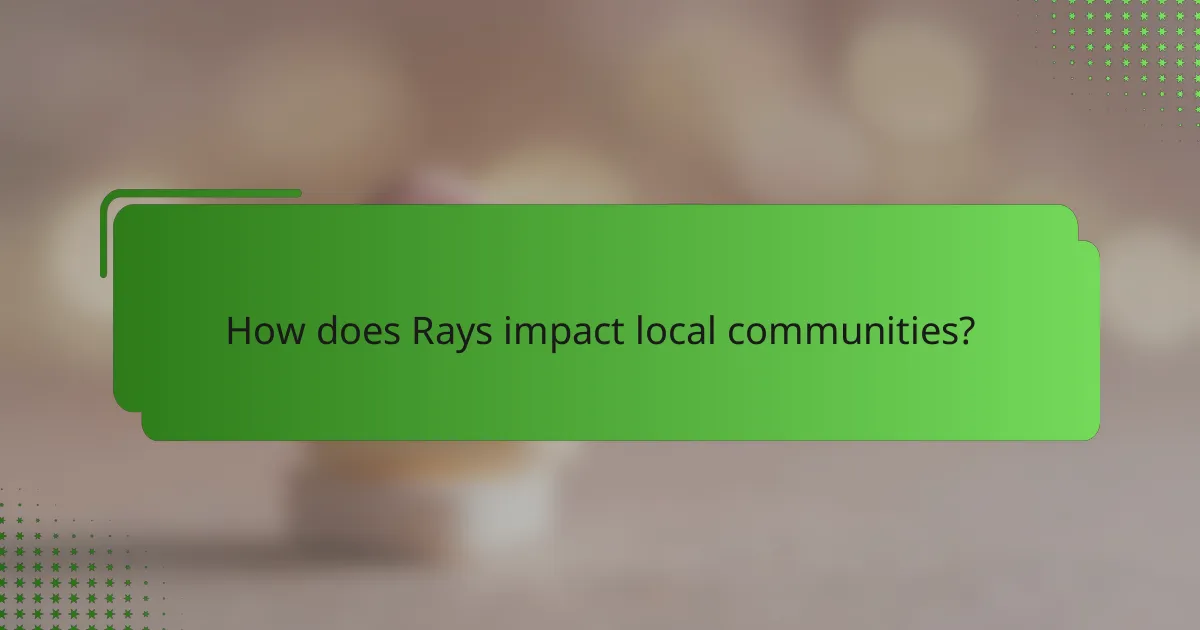
How does Rays impact local communities?
Rays positively influences local communities by prioritizing sustainable practices and ethical production, which fosters economic growth and social responsibility. Through various initiatives, the brand aims to uplift local economies while promoting environmentally friendly methods.
Community engagement initiatives
Rays actively participates in community engagement initiatives that focus on environmental education and sustainable development. These programs often include workshops, clean-up drives, and awareness campaigns that encourage local residents to adopt eco-friendly practices.
By collaborating with local organizations, Rays helps to create a network of support that empowers community members to take part in sustainability efforts. This not only enhances community cohesion but also raises awareness about the importance of protecting natural resources.
Support for local artisans
Rays is committed to supporting local artisans by sourcing materials and products from them, which helps sustain traditional crafts and skills. This partnership not only provides artisans with fair compensation but also promotes cultural heritage within the community.
Through initiatives such as workshops and mentorship programs, Rays equips local artisans with the tools and knowledge needed to enhance their craft. This support can lead to increased visibility and sales for these artisans, ultimately contributing to the local economy.
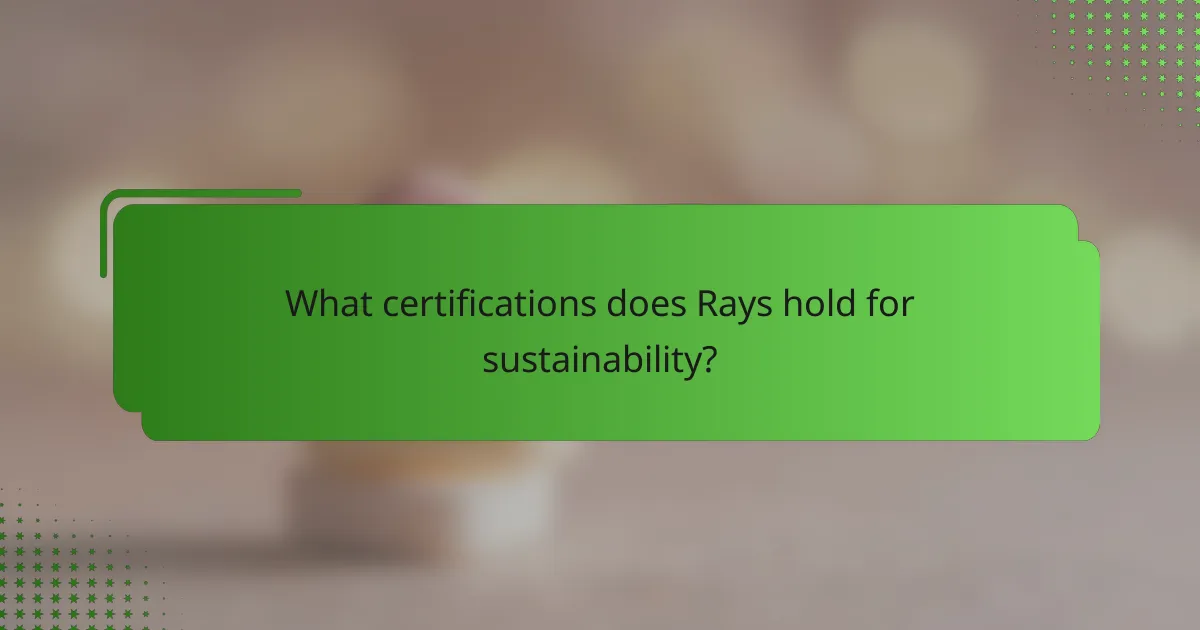
What certifications does Rays hold for sustainability?
Rays holds several key certifications for sustainability, demonstrating its commitment to ethical production and environmentally friendly practices. These certifications include the Global Organic Textile Standard (GOTS) and Fair Trade Certified, both of which ensure that the brand meets rigorous standards in organic materials and fair labor practices.
Global Organic Textile Standard (GOTS)
The Global Organic Textile Standard (GOTS) is a leading textile processing standard for organic fibers, covering the entire supply chain from harvesting to labeling. To achieve GOTS certification, a product must contain at least 70% organic fibers and meet strict environmental and social criteria.
GOTS certification ensures that the textiles are produced without harmful chemicals and that workers are treated fairly. Brands like Rays that are GOTS certified often undergo regular inspections to maintain compliance, which adds an extra layer of trust for consumers.
Fair Trade Certified
Fair Trade Certified products ensure that producers receive fair wages and work in safe conditions. This certification focuses on empowering farmers and workers, promoting sustainable livelihoods, and fostering community development.
For Rays, being Fair Trade Certified means that their products not only support ethical labor practices but also contribute to social and environmental sustainability. Consumers can look for the Fair Trade label as a quick way to identify products that align with their values regarding ethical consumption.
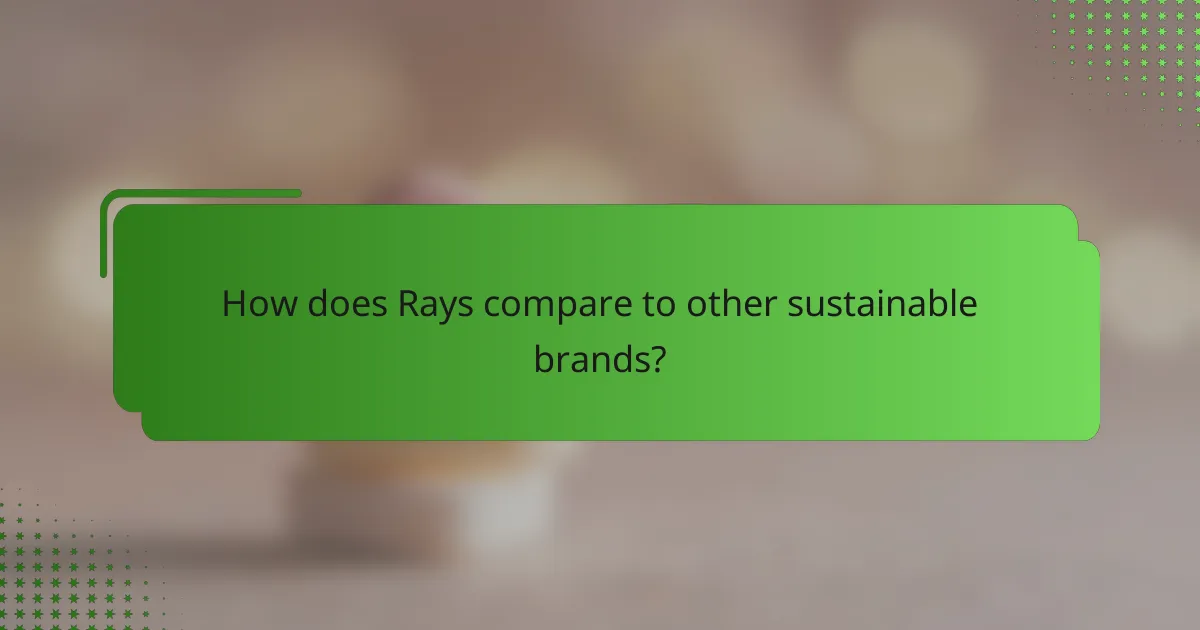
How does Rays compare to other sustainable brands?
Rays stands out among sustainable brands by emphasizing ethical production and transparency in its supply chain. While many brands claim sustainability, Rays focuses on measurable impacts and community engagement, setting it apart from competitors.
Comparison with Patagonia
Rays and Patagonia both prioritize environmental sustainability, but their approaches differ. Patagonia is known for its extensive use of recycled materials and commitment to activism, often encouraging customers to repair rather than replace products. In contrast, Rays focuses on ethical labor practices and local sourcing, which enhances community support.
While Patagonia has a broader range of outdoor apparel, Rays targets a niche market with stylish, everyday wear that maintains sustainability. Both brands have loyal followings, but Rays appeals more to consumers looking for urban aesthetics combined with ethical values.
Comparison with Everlane
Rays and Everlane share a commitment to transparency in pricing and production, but their product offerings differ significantly. Everlane is known for its minimalist designs and direct-to-consumer model, which helps keep prices competitive. Rays, however, emphasizes a blend of style and sustainability, often at a higher price point due to its ethical sourcing practices.
Both brands provide detailed information about their supply chains, but Rays goes further by actively engaging with local communities. Consumers choosing between the two should consider whether they prioritize minimalist design or a stronger focus on ethical production and community impact.

What are the customer benefits of choosing Rays?
Choosing Rays offers customers high-quality products that are not only stylish but also sustainably produced. By selecting Rays, consumers support ethical practices and contribute to a positive environmental impact.
High-quality, eco-friendly products
Rays focuses on creating high-quality products using eco-friendly materials, ensuring durability and style. Customers can expect items made from organic cotton, recycled polyester, and other sustainable fabrics that meet rigorous environmental standards.
When shopping for eco-friendly options, look for certifications such as GOTS (Global Organic Textile Standard) or OEKO-TEX, which indicate adherence to strict environmental and social criteria. This helps ensure that the products you choose are genuinely sustainable.
Positive environmental impact
By choosing Rays, customers contribute to reducing waste and minimizing carbon footprints. The brand employs practices like using renewable energy in production and implementing recycling programs to lessen environmental harm.
Supporting brands like Rays can lead to a broader shift in the industry towards sustainable practices. Each purchase helps promote ethical production and encourages other companies to adopt similar eco-friendly initiatives, ultimately benefiting the planet.
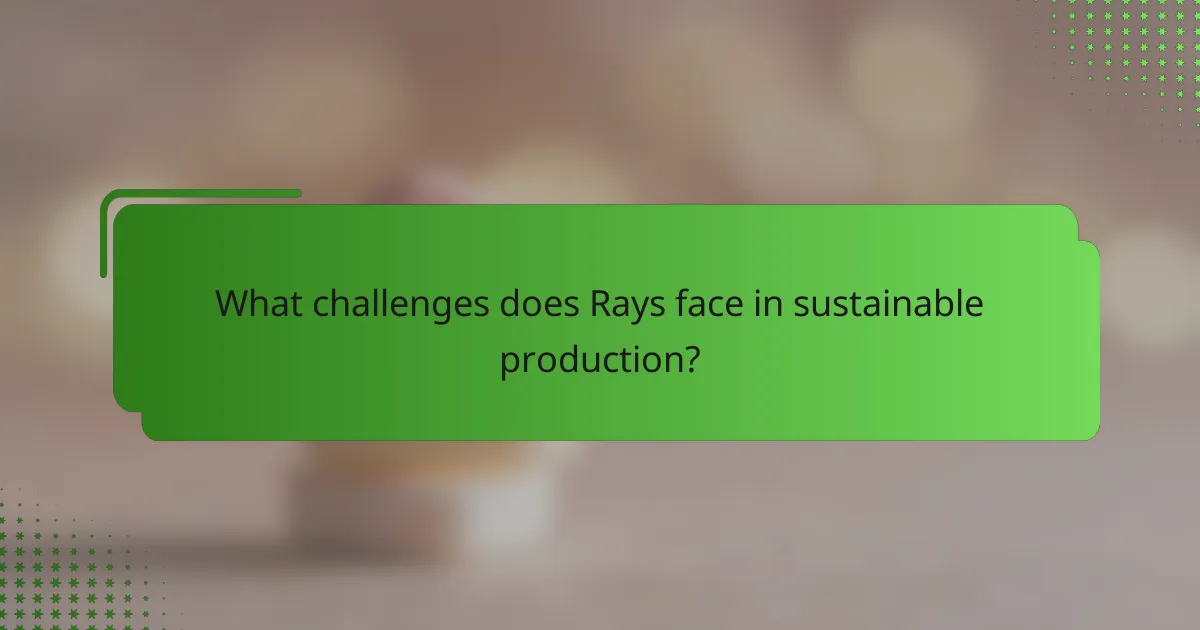
What challenges does Rays face in sustainable production?
Rays encounters several significant challenges in sustainable production, primarily related to supply chain management and the cost of sourcing eco-friendly materials. These obstacles can hinder their ability to maintain ethical practices while remaining competitive in the market.
Supply chain disruptions
Supply chain disruptions can severely impact Rays’ sustainable production efforts. Factors such as natural disasters, geopolitical tensions, or pandemics can lead to delays in sourcing materials, affecting production timelines and costs. For instance, if a key supplier of organic cotton faces a disruption, it can ripple through the entire production process.
To mitigate these risks, Rays can diversify its supplier base and establish contingency plans. Engaging with multiple suppliers across different regions can help ensure a steady flow of sustainable materials, reducing reliance on any single source.
Cost of sustainable materials
The cost of sustainable materials often presents a significant challenge for Rays. Eco-friendly options, such as organic cotton or recycled polyester, can be more expensive than conventional materials, impacting overall production costs. This price difference can range from 10% to 50%, depending on the material and market conditions.
To address this issue, Rays can explore partnerships with sustainable material producers to negotiate better pricing or invest in innovative technologies that lower production costs. Additionally, educating consumers about the value of sustainable products can help justify higher prices and foster brand loyalty.

How does Rays ensure product quality?
Rays ensures product quality through stringent sourcing, manufacturing processes, and continuous testing. By adhering to high standards and ethical practices, they maintain a commitment to delivering durable and sustainable products.
Material Sourcing
Rays prioritizes sourcing materials that are both sustainable and high-quality. They work with suppliers who adhere to environmental regulations and ethical labor practices. This ensures that the raw materials used in their products are responsibly harvested and contribute to overall product integrity.
Manufacturing Processes
The manufacturing processes at Rays are designed to minimize waste and maximize efficiency. They utilize advanced technologies that reduce energy consumption and lower emissions. Regular audits and certifications help maintain compliance with industry standards, ensuring that each product meets quality benchmarks.
Quality Control Measures
Rays implements rigorous quality control measures throughout the production cycle. This includes multiple stages of testing, from raw materials to finished products, to identify any defects early. By using both automated and manual inspections, they ensure that only products meeting their high standards reach consumers.
Customer Feedback and Improvement
Customer feedback plays a crucial role in Rays’ commitment to quality. They actively seek input from consumers to identify areas for improvement and adapt their practices accordingly. This responsive approach helps them refine their products and maintain high levels of customer satisfaction.










